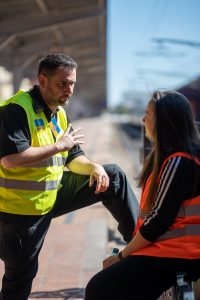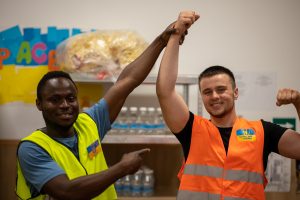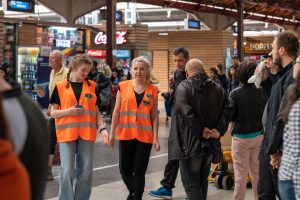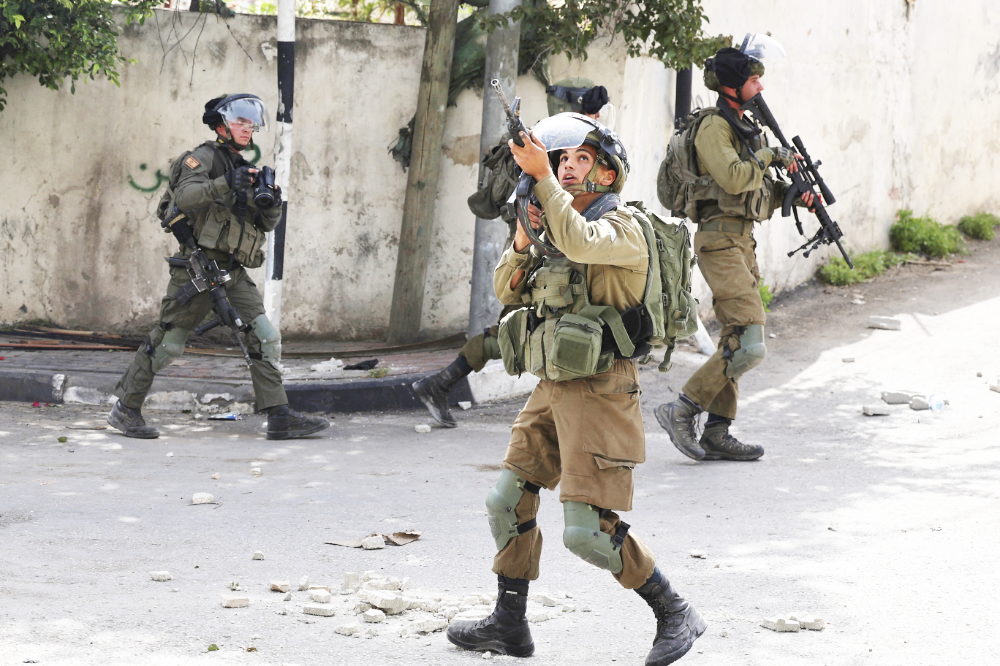Agencies-Gaza post
Romanian paramedic shows relief to Ukrainian refugees at the railway station
“She gave birth right here,” states Teodor ‘Dodo’ Nemteanu, indicating to the floor of a dimly-lit room at Bucharest’s Gara de Nord train station.
The space which is above the World Food Kitchen has since been converted into a space for Ukrainian mothers with newborns.
The woman’s contractions started whilst getting off one of the numerous trains from Ukraine’s border since the war began, more than 100 days ago. Dodo, a trained paramedic, gave the baby with his team – the mother named her daughter Teodora, in his honor.
For Dodo, a gently-spoken man of 44, it started on the bitterly cold morning of February 25th, the day after Russia invaded Ukraine. He had just finished a long shift as a paramedic, aiding homeless people on the streets of the city center.
„I stopped work at 4 a.m, came into the train station to make sure I hadn’t forgotten anything and there were three guys here from the Romanian social services,” he told Universul.net.

They questioned me ‘Dodo, can you stay here an hour longer?’, and I asked them why. ‘A train is coming with refugees from Ukraine’.
I said, ‘Refugees from Ukraine? Is that a joke?’. ‘No’, they told me, ‘the war has begun, Russia is attacking Ukraine.’” Dodo hadn’t yet heard the news but he spent the next 24 hours at the station.
In the initial days of the war, the biggest challenge was the language barrier: “Immediately the trains started coming. On the morning of the 25th, one train had 400 people on it. It was terrible, there were only four of us who were using our phones to translate everything. They wanted to go to different countries and we had to work out how”.
Through media range, word soon got out that translators were desperately required at the station, as countless trains came daily. Romania, with its large population of Moldovans who often speak both Romanian and Russian, became integral to the operations at the station. “We need them like the air that we breathe”, said Dodo.
Razvan, a 17-year-old school student from Moldova, has been living in Bucharest for the last year and began volunteering at Gara in early March. “It was all over social networks saying Gara needed help with translation. I wanted to come here to help people”.

Quickly a system was put in place at Gara de Nord using jackets and walkie-talkies – “orange jackets were for translators, yellow jackets were for volunteers. There was one translator for every 20 volunteers in the beginning”, Dodo told Universal.
He has confirmed to the volunteers and gifts sent to Gara right from the beginning, in a voluntary full-time role, working alongside the social services at the train station. Due to a huge drop in those leaving Ukraine and a relative amount returning, there are currently just a handful of volunteers at Gara de Nord at any one time.
Firstly, Dodo was provided ‘Room 2’ to coordinate, though it quickly became clear more space was needed. At the station’s busiest, 4 rooms were dedicated to Ukrainians. “I broke the glass of what became Room 1 because no one could find the keys. We set it up as a room for food and also a storage facility”.
The system depends entirely on donations from the public and businesses. “Citizens came in the first few days to the waiting rooms and asked how they could help, I was getting hundreds of messages a day. I told them and my contacts through my business that I need a boiler fitting, for tea, coffee, and food, for example. In a maximum of two days, Room 2 had everything it needed.”
As of June 1st, there have been 587,219 border crossings from Ukraine into Romania, though half this number have since returned – according to the UN. Romania has taken the 4th highest number of Ukrainian refugees of any other country in the world.
Ukrainians, too, are doing whatever they can to help. Nataliya, a 35-year-old nail technician from Mykolaiv fled to Romania two months ago and has been volunteering in the train station ever since. When the war began, Nataliya stayed in Mykolaiv, which is currently being attacked – helping to receive supplies for the military – but it soon became too dangerous.
“I cried all the way to Romania – I felt guilty for saving my life. For the first week I was like a zombie.” It is the first time Nataliya has been outside her own country. “I decided that here too, I can help. I am one of them. I can help with my time and my understanding.”

Initially, refugees came in their thousands through the train station each day – now it’s in the hundreds but Dodo, who has a family of his own, still sleeps above the World Food Kitchen 5 nights a week.
Traumatic environment
“I do what I do because how can I go home to my children otherwise? When my son asks me who were the Ukrainian children I helped today, how can I say I didn’t help?”. But, three months of working in a high-pressure and traumatic environment has come with emotional consequences.
“In the first week, there was a woman with children in the waiting room, video calling her partner. I heard gunfire on the ground and she was just saying ‘I love you I love you.”
This woman’s husband was in the army; he was slain on camera. „She fell to the ground and I took the two kids away so they couldn’t see her, she was screaming.”
I’ll never forget that, I heard it every night before I slept for a long time.”
Source: HERE
















